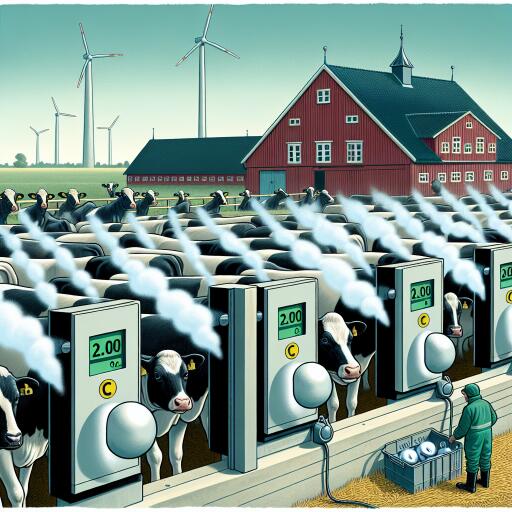
Denmark Leads with a Trailblazing Emissions Tax on Farm Animals
In an unprecedented move poised to set a global precedent, Denmark has announced the implementation of an emissions tax directly targeting the greenhouse gases produced by farm animals such as cows, pigs, and sheep. This initiative is slated to commence in 2030, signifying the country’s ambitious stride towards mitigating climate change impacts emanating from the agricultural sector.
The tax scheme unveiled by Danish authorities outlines that farmers will be liable for a fee of approximately $43 per metric ton of carbon dioxide equivalent emissions attributed to their livestock in 2030, escalating to around $108 by 2035. To cushion the agricultural sector, a 60 percent tax rebate is to be applied, reducing the payable amount to about $17 per metric ton in the initial phase and $43 per metric ton five years down the line.
Denmark’s innovative fiscal approach is expected to curtail the nation’s greenhouse gas emissions by an estimated 1.8 million metric tons of carbon dioxide equivalent by the year 2030. This bold measure places Denmark at the forefront of global efforts to reduce methane emissions, alongside fostering the transition of its agricultural domain towards more sustainable methodologies.
The Danish Tax Minister, Jelpping the collaborative nature of this initiative, emphasized Denmark’s pioneering role in introducing such a direct emissions levy on agriculture. The consensus reached encompasses not only governmental factions but also spans across farmers, industry stakeholders, and worker unions, showcasing a unified front in the battle against climate change.
The revenue garnered from this tax during its initial years (2030-2031) is slated for reinvestment into the agricultural sector to bolster its green transition, with reassessment planned for subsequent years. Furthermore, the legislation encompasses an ambitious plan to institute new forestry areas exceeding 600,000 acres alongside other ecological enhancement projects.
The rationale behind targeting methane emissions through this tax stems from the significant impact this greenhouse gas has on global warming. The U.N. Intergovernmental Panel on Climate Change (IPCC) underscores the necessity of slashing methane emissions by 40 to 45 percent by 2030 to maintain the trajectory towards limiting global temperature rise within 1.5 degrees Celsius this century. The agricultural sector, especially livestock farming, is a principal source of methane emissions, attributing to the urgency of implementing measures such as those undertaken by Denmark.
In contrast, New Zealand had contemplated a similar tax aimed at reducing livestock methane emissions, given its significant contribution to the country’s greenhouse gas footprint. However, the proposal was shelched by the country’s new administration amid backlash from the farming community. New Zealand now explores alternative avenues, including the development of a ‘methane vaccine’ and the breeding of lower-emission livestock, though these solutions remain economically unviable for farmers at present.
Nonetheless, the commitment by international agricultural corporations towards setting and achieving emissions reduction targets demonstrates a growing recognition of the sector’s role in combating climate change. Such corporate initiatives potentially offer a more palatable alternative to direct taxation measures, which can sometimes provoke resistance from agricultural stakeholders.
As Denmark embarks on this ground-breaking journey, the world watches keenly. The success of Denmark’s emissions tax on livestock could not only prove instrumental in curbing global methane emissions but also serve as a replicable model for other nations seeking to harmonize agricultural productivity with environmental stewardship.





Leave a Reply